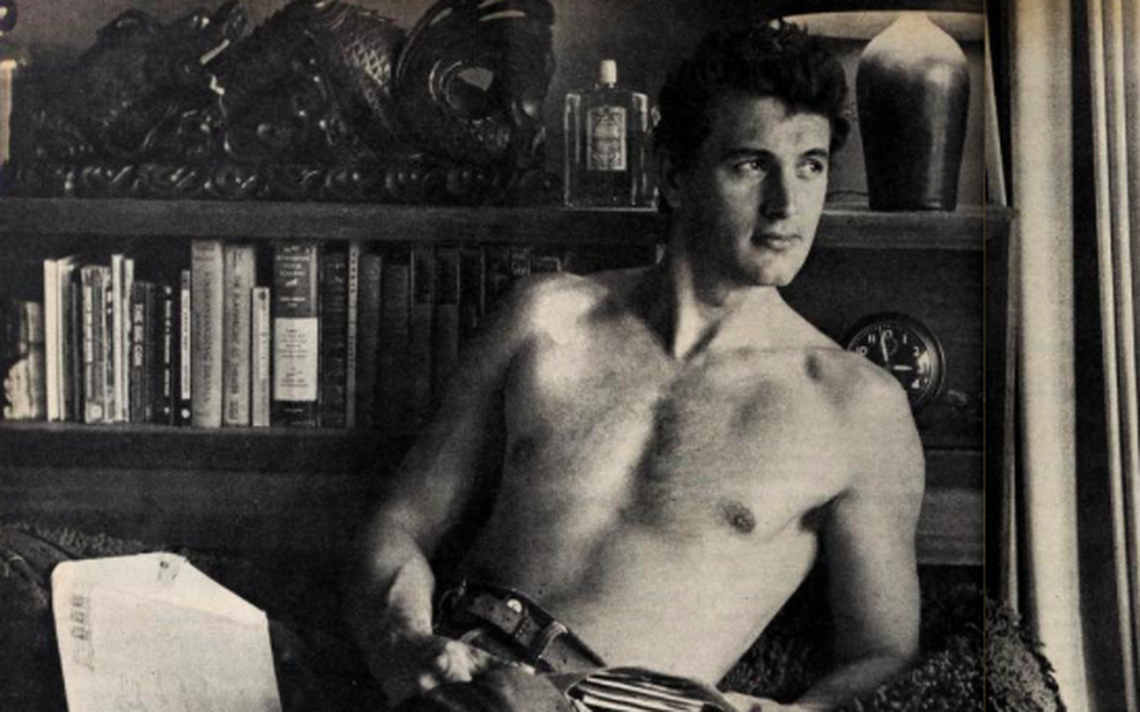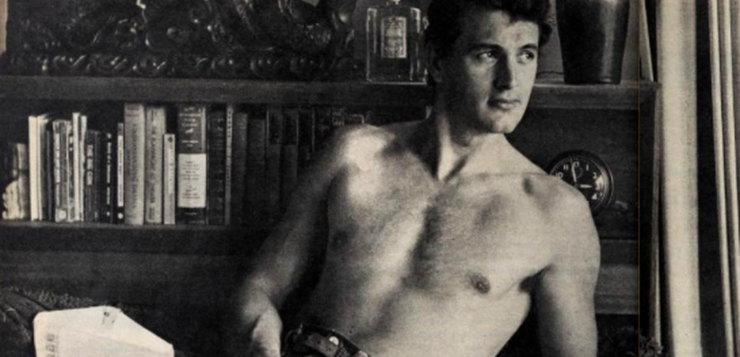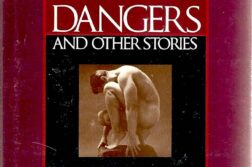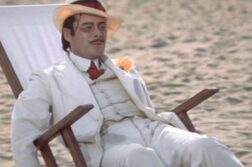HIS REAL NAME was Roy Harold Scherer, Jr. Hollywood needed a more glamorous name on theater marquees, so it took two of the world’s natural wonders—the Rock of Gibraltar and the Hudson River—and baptized the 6’4” truck driver from Winnetka, Illinois (population of 12,105 in 1950), with a moniker crafted from the two sites, and a star was born. The first matinée idol of his kind, Rock Hudson ushered in the era of the earthy he-man.
The 1950s hunk was all about the American outdoors. In Giant (1956), Hudson is the quintessential cowboy, a strapping figure who races on horseback across the Texas plains amid a panorama of mountains and sky. As Jane Wyman’s love interest in All That Heaven Allows (1955), he’s a gardener in jeans and a lumberjack top. Even in his pairing with Doris Day in some of the best romantic comedies ever made—Pillow Talk (1959), Lover Come Back (1961), and Send Me No Flowers (1964)—Hudson is every lady’s stud and every dude’s pal. (Yep, guys liked him too.)
Rock Hudson’s appeal extended to regions beyond the U.S. coastline. My mother was a fan in the Philippines. As a comely seventeen-year-old in the mid-1950s, she was featured in a Philippine newspaper supplement in which she listed red roses and Rock Hudson movies among her favorite things. Thirty years later, my sister was a fan. That wholesome, masculine image helps explain the actor’s multi-generational popularity, particularly for women and girls. James Dean was too tortured, Montgomery Clift was too sullen, and Marlon Brando was downright scary.
In contrast, Rock Hudson was perfect. He was the alpha male that embodied the princely characteristics that women raised on “Prince Charming” fairy tales could fall for. Even with hair unkempt, he was always immaculately groomed. With strong features that lived up to his first name, he was the hero who could always save the day.

The irony and the misfortune is that Rock Hudson himself needed saving. As Hollywood’s premier box office draw, the revelation that he was gay would have cost the studios millions of dollars. Women would have been distraught. Some men may have gloated, while others would have been crestfallen. Everybody would have been disgusted in this pre-Stonewall age when homosexuality was viewed as a psychological disorder.
According to author Armistead Maupin, a close friend to Hudson back in the day, the actor sought refuge in San Francisco when his secret was at risk. But Confidential magazine got wind of the truth and threatened to expose him. To protect Hollywood’s cash box, agent Henry Wilson sacrificed Tab Hunter, another closeted heartthrob, to the gossip mill instead, and then married off Hudson to his secretary, Phyllis Gates, whom Wilson’s biographer revealed years later to be a lesbian.
How crippling this masquerade must have been for Rock Hudson. The severe homophobia of the McCarthy era had conditioned him to believe he was an aberration of nature. So ingrained was his self-loathing that even when he became the most famous face of AIDS in the 1980s, his first instinct was to deny that he was gay.
My early adulthood coincided with the actor’s return as front-page news. I was a freshman in college, a man-boy from the Philippines new to America, whose liberal atmosphere emboldened me to confront my own homosexuality. Since I was focused on my own coming out issues, I was ignorant of the Reagan administration’s refusal to tackle the AIDS epidemic. (I was more interested in my current boy crush, a German-Puerto Rican skateboarder named Ralph who had a deep voice, a square jaw, and a rounded derriere that a pair of Levi’s 501’s accentuated.) However, the tabloid headlines of Rock Hudson imperiling Dynasty star Linda Evans with a kiss when he guest-starred on the series seized my attention, as did the jokes that circulated once Hudson’s condition became widely known.
I recently watched on YouTube an account of Hudson’s last months. While in Paris to receive treatment, he was staying at the Ritz Carlton, gaunt and bed-ridden. Nobody wanted to hug or touch him. What a colossal fall this truly was for a man once worshiped as a specimen of masculine superiority. Then again, such an elevated status is a set-up for a fall, as we are all mortal and subject to decay. The more idealized we are, the harsher the world can be as our humanity betrays itself with every personal setback.
As much as we’d like to believe in progress, times have not entirely changed since Hudson’s demise. Despite the Internet’s ability to expose people to customs and lifestyles different from their own, and despite increased acceptance of openly gay actors such as Matt Bomer and Wentworth Miller, a code of silence continues to muzzle many well-known actors whose careers are cemented in a macho image. Other actors who are undoubtedly gay (Tom Cruise, anyone?) continue to remain in the closet for fear of damage to their reputation, self-image, or whatever it is that they’re clinging to.
Rock Hudson died of AIDS-related complications at the age of 59. For all his capacity to make men laugh and women fall in love, the press summed up his legacy in a single acronym: AIDS. That was enough for a once adoring public to turn its back on him.
Rafaelito V. Sy is the author of Potato Queen, a novel that explores the relationship between Asians and Caucasians in the San Francisco gay community.






